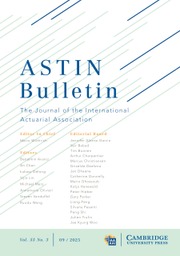Article contents
Fair Pricing of Life Insurance Participating Policies with a Minimum Interest Rate Guaranteed
Published online by Cambridge University Press: 29 August 2014
Abstract
In this paper we analyse, in a contingent-claims framework, one of the most common life insurance policies sold in Italy during the last two decades. The policy, of the endowment type, is initially priced as a standard one, given a mortality table and a technical interest rate. Subsequently, at the end of each policy year, the insurance company grants a bonus, which is credited to the mathematical reserve and depends on the performance of a special investment portfolio. More precisely, this bonus is determined in such a way that the total interest rate credited to the insured equals a given percentage (participation level) of the annual return on the reference portfolio and anyway does not fall below the technical rate (minimum interest rate guaranteed, henceforth). Moreover, if the contract is paid by periodical premiums, it is usually stated that the annual premium is adjusted at the same rate of the bonus, and thus the benefit is also adjusted in the same measure. In such policy the variables controlled by the insurance company (control-variables, henceforth) are the technical rate, the participation level and, in some sense, the riskiness of the reference portfolio measured by its volatility. However, as it is intuitive, not all sets of values for these variables give rise to a fair contract, i.e. to a contract priced consistently with the usual assumptions on financial markets and, in particular, with no-arbitrage. We derive then necessary and sufficient conditions under which each control-variable is determined by a fair pricing of the contract, given the remaining two ones.
- Type
- Articles
- Information
- Copyright
- Copyright © International Actuarial Association 2001
References
- 112
- Cited by


